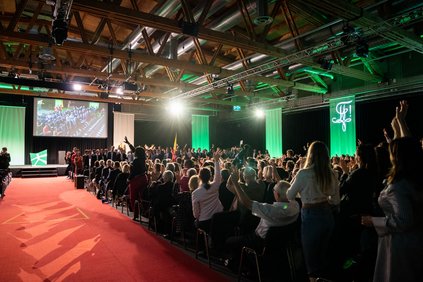Campus - 22.02.2011 - 00:00
HSG sets the course for the future
With ten new chairs by 2012, a sharpening of its research profile, and innovations to teaching, the HSG intends to retain its position in the increasingly fierce international educational competition.
21 February 2011. Ever since 1 February 2011, the University of St.Gallen has been run by a new executive, namely by President Thomas Bieger, Vice-Presidents Ulrike Landfester (Internationalisation and Regional Roots), Vito Roberto (Teaching) and TorstenTomczak (Research),as well as Administrative Director Markus Brönnimann. In an interview with the media at the beginning of the Spring Semester, University Chairman Stefan Köllikerand the President’s Board provided insights into the objectives and challenges of the HSG.
Extension of teaching capacities
In order to do justice to the HSG’s quality requirements despite increasing student numbers, an improvement in the teacher/student ratio was of high significance, said Kölliker. For this reason, the University’s Board of Governors had decided to extend the HSG’s teaching capacities to a significant extent. In a first tranche, ten additional chairs are intended to be established by 2012.
International positioning and responsible action
The HSG is now among Europe’s leading business universities. In the coming years, it would like to reinforce this position and also attain a top position outside Europe in certain areas. It would only remain attractive for outstanding faculty and students through a reinforcement of its international level of recognition achieved through top attainments in teaching and research, said President Thomas Bieger.
Besides positioning itself in the international competition, it is important for the HSG to educate personalities who act in a responsible and entrepreneurial manner, which is why Prof. Dr. Thomas Dyllickwas appointed as the first Delegate for Responsibility and Sustainability.
Novelties in teaching
Innovations have been planned in the field of teaching: besides adjustments in the Assessment Year, four of five Bachelor’s programmes are being reformed for autumn 2011, and the Bachelor’s programme in Economics will also be taught in English. From autumn 2011, the new Master’s programme in Organization Studies and Cultural Theory will raise the number of Master’s programmes to eleven. Further Master’s programmes are being planned for autumn 2012. From autumn 2013, English-language studies will be offered from the first year onwards, said Vice-President Vito Roberto.
Research solutions for trade and industry and society
In order to be able to conduct internationally recognised top-level research in selected fields, the HSG would concentrate the promotion of research on research foci such as “Work, Ageing and Welfare” and “Wealth and Risk”, as well as on profile areas, said Vice-President Torsten Tomczak. The HSG wants to be mindful of the established balance between basic and application-oriented research in all its activities. In addition, research should also always be a contribution towards the solution to current problems in trade and industry and in society.
Rooted in the region
The University’s executive conceives of the HSG’s regional roots and the concomitant contribution towards regional value creation and towards the transfer of knowledge and technology as a further important pillar. Vice-President Ulrike Landfester said that in this respect, she would encourage a dialogue between faculty and the general public above and beyond the Public Lecture Programme in order to become even more “tangible” to other people.
Necessary extension of the infrastructure
After the renovation and extension completed in autumn 2011, the HSG has a teaching infrastructure for 5,000 students. With today’s 6,700 students and a trend towards 7, 000 to 8,000 students, the existing infrastructure was too small by far, emphasised Administrative Director Markus Brönnimann. Since it would take some years for the political processes for a another extension to be concluded, further measures were being examined. One possibility would be an extension of operating times or new approaches to the use of external infrastructures.
Plannable funding
The maintenance of solid and plannable funding for the HSG constitutes a further challenge according to Brönnimann. Although the commitment of the public purse had increased in the last five years, it was decreasing if measured against the growth in student numbers. Here, ways would have to be found to raise funds for the extension of chairs and innovations in programmes and processes.
More articles from the same category
Discover our special topics











